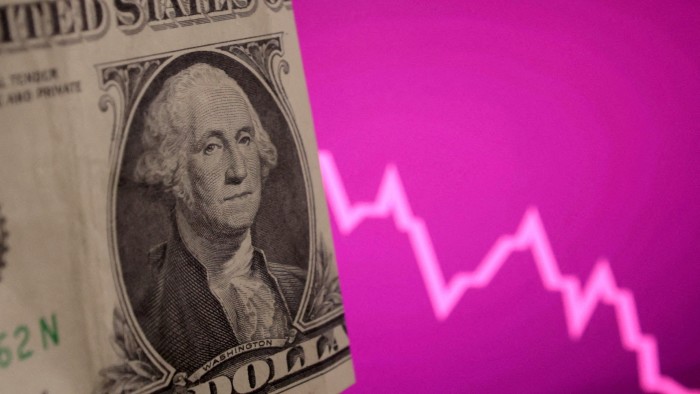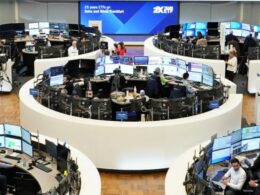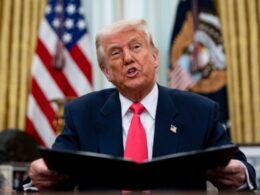This is an on-site version of the White House Watch newsletter. You can read the previous edition here. Sign up for free here to get it on Tuesdays and Thursdays. Email us at whitehousewatch@ft.com
Good morning and welcome to White House Watch! I’m Stephanie, one of the FT’s reporters in Washington. Steff will be back on Thursday. Today let’s get into:
-
Trump’s latest attacks on Jay Powell
-
Hegseth’s group chats on Signal
-
Stockpiling in New York’s Chinatown
President Donald Trump lashed out (again) at Federal Reserve chair Jay Powell yesterday.
In a post on Truth Social, Trump, who has repeatedly criticised the US’s top central banker for not lowering interest rates fast enough, branded Powell “Mr Too Late”.
Markets didn’t love it. The US dollar sank to a three-year low against a basket of its key trading partners — a move analysts and investors pinned on rising doubts over the Fed’s independence, as well as slow progress on making trade deals.
Wall Street stocks also took a hit. The S&P 500 dropped 2.4 per cent but was on track to recover some of its losses at the open on Tuesday. Gold has hit a record high in this morning’s trading as investors flock to haven assets.
Trump’s repeated attempts to pressure the Fed to lower interest rates “NOW” — and his increasingly fervent invectives against Powell — has drawn attention to the legal precedent that has protected independent government agencies for the past nine decades.
The president himself seems confident that he has the authority to fire the central banker. He told reporters in the Oval Office last Thursday: “If I want him out, he’ll be out real fast, believe me.”
Kevin Hassett, director of the National Economic Council, said on Friday that Trump would “continue to study” the matter of dismissing Powell, who has vowed to remain in office until the end of his term in May 2026.
The president’s vendetta has even raised alarm within his own party.
“I don’t think the president, any president, has the right to remove the Federal Reserve chairman,” John Kennedy, a Louisiana Republican who sits on the Senate banking committee, said on NBC on Sunday. “I think the Federal Reserve ought to be independent.”
FT subscribers can join us tomorrow for an Unhedged live event: The Trump effect on markets. Sign up here.
The latest headlines
What we’re hearing
Trump’s trade war with Beijing has brought panic to New York’s Chinatown.
“Everyone is hoarding,” said Andy Wang, the owner of Taiwan Pork Chop House. He has been stockpiling everything from rice wine to plastic containers to “keep operation costs stable for as long as possible” at the restaurant he founded in the late 1990s.
The administration’s 145 per cent tariffs on imports from China could shatter the business model for thousands of Chinese-American retailers and restaurants, which rely on supplies from the world’s workshop.
“I charge an affordable price but am still able to make a profit by sourcing from China,” said Wang. His pork chop over rice goes for $8.75 — cheap by the standards of New York.
Some importers have already raised prices. “With a 145 per cent tariff, I’ll be giving you Chinese products for free if I sell them at the original price,” said Deng Long, owner of wholesaler Strong America Ltd.
But many business owners are scared they’ll be unable to pass on these cost increases to their price-sensitive customers.
“There is no way our customers can accept prices going from $100 to $200 within such a short timeframe,” said Wu Jianxi, general manager of C&A Supermarket in the New York neighbourhood of Flushing.
Putting it bluntly, he added: “We can’t live with a 145 per cent tariff for a single day.”
Viewpoints
-
Economist Edwin Truman, a former US Treasury official, says the US would be scoring a “significant own goal” if it decides to withdraw from the IMF.
-
Europe should follow in the US’s footsteps by ruling against Google’s monopoly in search and advertising, writes Daron Acemoglu, a professor at MIT.
-
Ruchir Sharma, chair of Rockefeller International, lays out how high tariffs will reshape the global order, opening the door for new winners such as India and Brazil.
-
Even the most well-calibrated trade levies will fail to boost domestic manufacturing if they’re not backed up by comprehensive industrial policy, writes Rana Foroohar.
-
The Trump administration’s attack on universities is not about antisemitism, but rather is an attempt to control institutions that nurture independent thought, argues Gideon Rachman.
Source link









